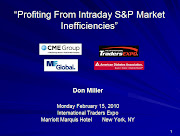John Donovan wrote the following in today's SI.com piece after last night's Sox-Rays ALCS game 6:
"They are at their best when they are beat up, lying by the side of the road and barely breathing. They laugh at pain. They feed on adversity. If the Red Sox don't fall hopelessly behind in a postseason series every once in a while and live to tell about it ... well, heck, they just don't feel like they've been true to themselves."
In my July 4th post to kick off this blog, you'll find the following:
"One of the things I did at the beginning of this year was to take a hard look at all of my trading shortcomings. In doing so, I discovered that one of my greatest weaknesses was getting sloppy and away from my game plan after a period of significant equity growth. On most occasions, the result was a drawdown and an resulting equity ceiling -- both real and perceived. Yet a decade of history also showed that one of my greatest strengths has always been refocusing and coming back from these times. That is when I've experienced my greatest focus and performance."
In recapping my thoughts on my July performance, especially coming back from the early month draw, I wrote:
"The intense state of focus during that week of comeback activity was just that -- intense. You could have poured hot water on me on any day during that time and I probably wouldn't have noticed."
-------
What is it about the human spirit when faced with gut-wrenching adversity? What allows some to intensify their focus while others wilt? And how do we keep putting ourselves in such adversity in the first place??
I wish I knew the answers ... especially to that last question! Yet perhaps it's part of the master plan for us not to. All I know is all of these quotes describe the #1 reason -- far above all others -- for this year's Bamboo performance at this end, which is to essentially mentally bypass the adversity by believing it had just happened.
And no, it of course doesn't work all the time, and I've had at least three significant chinks in the armor this year. But I know with all my heart that it has worked sufficiently enough to have caused this year's exponential growth in my equity curve.
We'd be kidding ourselves if anyone thinks this blog could turn any of us -- including me -- into never-lose trading robots. It simply ain't gonna happen. Yet I do hope it stirs reflections on your own businesses and lives.
-------
Perhaps Jimmy Valvano said it best in his stirring speech in 1993 when he accepted the Arthur Ashe courage award:
"(in describing his Jimmy V foundation) ... its motto is "Don't give up, don't ever give up." And that's what I'm going to try to do every minute that I have left. I will thank God for the day and the moment I have. Cancer can take away all my physical ability. It cannot touch my mind; it cannot touch my heart; and it cannot touch my soul. And those three things are going to carry on forever."
Trading and baseball clearly aren't as serious as cancer ... and perhaps it's inappropriate to even try to link them.
Then again, maybe not. Perhaps if we did take parts of life as seriously, we'd see dramatically different results and be able to more thoroughly enjoy the time we've been given on this planet, while sharing the rewards with others.
At this end, I know I'm not alone in my journey. Too many things have happened in my life to believe otherwise.
And maybe that's the most powerful concept of all ... belief.
A reminder the PalTalk lounge will be open tonight at 6:30pm ET for virtual drinks at 7pm, and we'll keep it open until the ALCS Game 7 starts at 8pm.
Sunday, October 19, 2008
Subscribe to:
Post Comments (Atom)
















1 comment:
being one of the analytical, engineer-types, this next statement does not come naturally from me: with time and experience, I become less concerned with, almost indifferent to, the 'whys' in life. especially when it comes to human or social questions. the answer i keep coming back to is 'we really don't know'. it's just too easy to become pre-occupied with causation when there is little to no empirical support. when people put too much stock in why they think something happens they develop skewed perceptions. they can no more accept it when something expected doesn't happen than they can believe something can happen that is not expected.
unfortunately, i think it is a natural, and often counter-productive, human tendency to try to explain why things happen, to understand why people do what they do.
i think you do what you do because it works. after 47 years of progressive experience you have developed a finely tuned sense of what makes you tick. that's all you need and puts you ahead of most of the pack. it's like your view of the day - it's a win because you won.
Post a Comment